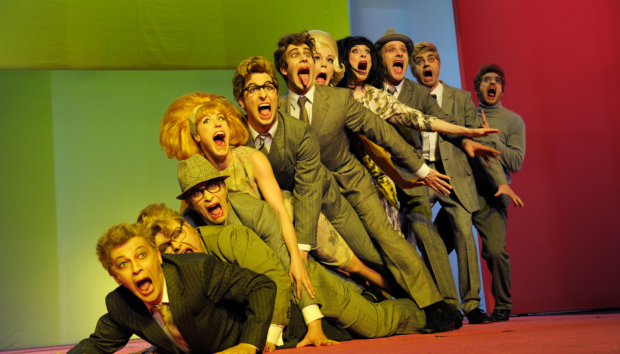Murmel Murmel (King's Theatre, Edinburgh)
The Edinburgh International Festival closes with a surreally entertaining German comedy

(© Thomas Aurin)
It's a minimalist extravaganza in three sections, very beautiful, athletic and fairly funny. As a programme note suggests, director/designer Herbert Fritsch's 11-strong cast look as though they're on over time at the Ministry of Funny Walks, though one or two of the pork-pie hatted, bespectacled suits resemble Eric Idle rather than John Cleese.
With costume changes done in full view silhouette, the first section is a compendium of swinging Sixties hipsters in suits, big wigs, one lad in Motown drag, tableaux of fashion show, dance floor, dropped trousers – this being a German "comedy" the exposed actor plays with his own joy stick – and pratfalls; if nothing else, this show ingeniously demonstrates endless ways of falling off the stage into an orchestra pit.
The glorious upside of the Teutonic torture – "Murmel murmel" is an imprecation, an aside, a song, an orgasmic utterance, a joke, a tic, an indecent suggestion – is an absolute rigour in the staging, and of course the whole shebang is organised by an army officer who plays marimba and electronic keyboard in the pit. His theatrical inmates progress into body-stockinged modern dance, a robotic modern ballet with masks and tutus that combines Expressionist satire with the feline arabesques of a Twyla Tharp or Paul Taylor dance troupe.
'Tosh' cried one colleague as we left the theatre
The red-carpeted stage is decorated with a sumptuous sliding show of pastel-coloured panels (gorgeously lit by Torsten Konig) that close and re-assemble smoothly like a photographic shutter frame. Finally, the cast – all different shapes and sizes (two women, one of them with her left arm in a temporary sling) – appear in clownish identikit, bald wigs, Slim Jim ties, all blowing on melodicas, or mini-keyboards.
"Tosh" cried one colleague as we left the theatre, "Emperor's New Clothes" another. I disagree on both counts. I didn't laugh much, but I did greatly admire the nonsensical and technical bravura of the actors. And you can't puncture the aspirations of a show that doesn't claim anything for itself except a penchant to amuse.
The text – ha-ha – of the endlessly repeated word was a piece of concrete poetry published on 176 pages in 1974 by the wacky Swiss artist Dieter Roth. He agreed to Fritsch making a theatre piece from it as long as he promised to bore the audience rigid.
Roth died in 1998, Fritsch – who was born in Augsburg, Brecht's home town, in 1951 and worked as an actor for many years with the Volksbühne's most distinguished modern director, Frank Castorf – first produced the piece two years ago, and you could argue that he's badly betrayed Roth in not being nearly boring enough. Beckett's hyper-minimalist five-minute Breath had the lights rising and falling on a pile of rubble and a distant cry. Murmel Murmel puts cabaret into codswallop, grace into grey and real verve into the vapid.













